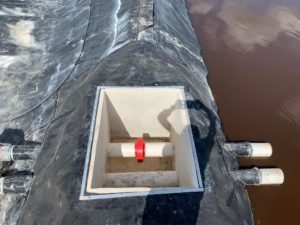Pig farms generate large volumes of wastewater. Said wastewater must be treated for recycling and proper final disposal. One of the most complex and expensive parameters to control, are the total and fecal coliforms, which come with this wastewater.
The actual case is a pig farm in Yucatán, México. This farm is located close to Chichén Itzá, where the world famous pyramid of the maya culture can be found. As farming pigs, is a success story in Yucatán, these farms are standardized and can be found all over the state.
The actual farm has 3 modules and holds in total 36,000 fattening pigs. These pigs produce app. 1,000 m³ of effluent a day. This wastewater has of course to be treated in a treatment plant in order to meet the requirements of the authorities. The effluent water should be used when leaving the treatment plant, for irrigation of trees.
Wastewater treament process

There are two open aeration basins as secondary treatment after the bio fermentation plant. Forced aeration with air is used to oxidize the remaining organic matter. Bacteria and enzymes in combination with the air reduce the COD and BOD of the wastewater. At the transition from basin 3 to basin 4 the Merus rings come into play. As can be seen in the photo, the ring is installed on the six inch pipe, between the two aerobic ponds. This way it is ensured, that all wastewater entering the basin 4 is treated. The wastewater treatment process is a continuous process. The plant is operating 24/7 and so ensures the wastewater is constant treated.
Coliform bacteria
One of the contaminant, which cant be treated by this wastewater treatment process, are the total and fecal coliform bacteria. A pig farm as described here can easily have more then 2 Million CFU / 100 ml. In this plant the offical Mexican NOM-001-SEMARNAT-1996 standard is used, which requires for the effluent water less than 1000 CFU / 100ml. Previously chemical treatment was used to reduce coliform bacteria. Mainly sodium hypochlorite or copper sulfate. Both chemicals are not only considered to be harmful and polluting, but also quite expensive. A plant of this size has to spend between 1,000 and 1,800 EURO per month for chemicals to control the total and fecal coliform bacteria in its wastewater.
Results obtained
45 days after the installation of a 6” BIO HCI Merus ring on the pipeline between lagoon 3 and 4 of the wastewater treatment plant. Customer observed a marked drop in total and fecal coliform bacteria. Analyzes of a certified laboratory support the result, levels of less than 100 CFU/100 ml of pathogenic microorganisms were obtained in the treated water.
The customer needs no chemicals anymore in the treatment process. The savings in chemicals lead to a ROI of less than 6 month. The pig farm managed to be well below what the regulations mark, in an economically viable and environmentally sustainable way.
How can Merus Rings achieve this?
The treatment plant has to treat only organic compounds. There are no other pollutants except what comes from the pigs. The coliform bacteria come from the pigs, there is no way around. But the bacteria need a place to multiply. Such places are usual biofilm.
Merus is very strong in fighting biofilms, this we have proven in a lot different applications. And as it is seen in the actual case we can even remove the biofilm in environments such as wastewater treatment plants.
